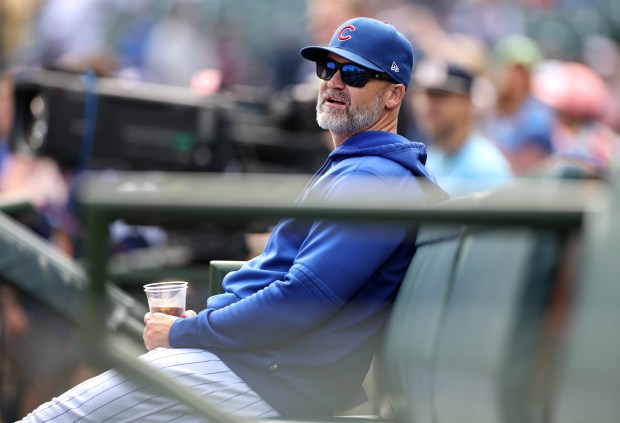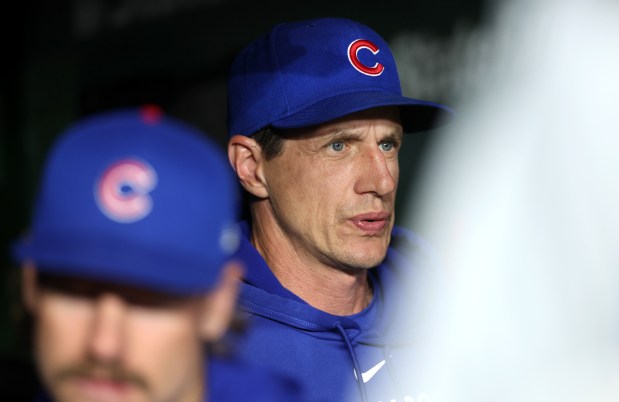Jed Hoyer faced a dilemma last year after the Chicago Cubs collapsed in September and blew a National League wild-card spot.
The team president knew David Ross’ future would be an ongoing narrative in the final year of the manager’s contract in 2024, just as Joe Maddon’s future was a story in 2019.
Hoyer’s predecessor and former boss, Theo Epstein, handled the Maddon situation deftly, making a preemptive strike at the general managers meetings in November 2018 by telling the media the Cubs would not be offering Maddon a contract in the offseason.
“Honestly the only concern expressed was it could be a bit of a distraction at some point, so I decided the best thing to do was get that news out now,” Epstein said. “We’re not running away from Joe in the least bit.”
Maddon said he understood completely. That didn’t stop the media from speculating on Maddon’s future all during the 2019 season, which ended with the Cubs running away from the only manager to win a championship on the North Side since the invention of radio.
Ross, then an ESPN analyst and special adviser to Epstein, was seen surveying the Cubs from the baseball operations department suites at Wrigley Field during the final month of 2019 as Maddon played out the string as a lame-duck manager. As players cleaned out their lockers after the season, one told a friend to “put all your money” on Ross getting the job.
Ross was handcuffed in his second year when Hoyer took over for Epstein and executed a sell-off of stars, starting the rebuild that wasn’t labeled a rebuild. But Ross was supposed to compete for a playoff spot by Year 4, and the way the Cubs blew it in September was a poor reflection on his job performance.
Hoyer’s decision to move on from Ross was made a bit easier when Craig Counsell became a free agent after the season and agreed to an interview at Hoyer’s North Shore home. Hoyer had received the blessing of ownership to fire Ross, a personal favorite of co-owner Laura Ricketts, and spend a record amount of money to try to reel in Counsell.
Given the option of hiring someone considered one of the best in the game or sticking with a well-liked manager who might have to be let go during or after the 2024 season, Hoyer opted for organizational change over the status quo.
The move, while cold-blooded and shocking, was lauded by most fans and the media. Counsell’s reputation as a manager who squeezed the most wins possible from a small-market budget was apparent. No one in the National League Central was likely to splurge in free agency. Maybe a better manager would make the difference in a team that fell one game shy of the postseason.
What could possibly go wrong?
There’s no need to dwell on the grimy details, but things went horribly wrong for the Cubs this season. Now Hoyer has replaced Ross on the hot seat, with a growing percentage of fans calling for new leadership at the top.
Hoyer has one year left on his contract, which does not appear in jeopardy. Epstein waited until the final year of his five-year deal to get a five-year extension in September 2016, as the Cubs were about to enter a postseason that would culminate in their first championship since 1908. Hoyer could do likewise before he talks extension with Chairman Tom Ricketts, but obviously he’s not in the same position of strength as Epstein was in ’16.
Ricketts could look at the payroll and wonder why a team full of high-priced veterans didn’t perform, or he could wonder whether Hoyer built the team the right way.

Ricketts hasn’t spoken about the Cubs’ issues. He waited until the final day of the 2023 season to address the media in Milwaukee and famously said of Ross: “He’s our guy, so I like him a lot. He had a good year. … He’s a great manager.”
Ricketts admitted that rebounding in the summer and falling short was no moral victory, adding “we don’t play for consolation prizes.”
A year later, little has changed — except the manager. Now Hoyer and Counsell will have to wear it after a failed season.
Some fans believe Counsell threw Hoyer under the bus Thursday with his pronouncement the Cubs “should try to be building 90 win teams here. That’s like what you have to do. That’s the playoff standard. … From that perspective we’ve got a ways to go.”
That’s not really Counsell’s style. The statement, however, was surprising in that Counsell never has let on publicly this season that he didn’t believe the Cubs were capable of being a 90-win team. For the most part he voiced optimism there was plenty of time left for a late-season run. He strenuously defended players who weren’t performing up to expectations, including Héctor Neris, Dansby Swanson, Christopher Morel and Pete Crow-Armstrong.
Counsell knows how to send a message through the media from his years as a player and manager and chooses his words carefully, unlike Ross, who could ramble when left unchecked. For evidence, google his epic postgame rant on “Roofgate” in Milwaukee from July 4, 2023.
“One of things you learn as you go on managing is the role of the media and the value of it, really,” Counsell said in late May in St. Louis. “It’s an important part of the job. You anticipate more when you move to a city with more eyes on you. It’s important to take it seriously and be a messenger for your organization and to the fans.”
The message he sent Thursday was the Cubs roster was not constructed to be a 90-win team. Hoyer obviously is the one tasked with building that roster and will be the one tasked with fixing it.
Counsell isn’t one to rush to judgment, as we learned with his patience with Crow-Armstrong, allowing the rookie to play through struggles before finally figuring things out. He gave Seiya Suzuki ample time in right field before using him mostly as a DH. Morel was dealt at the trade deadline after his defensive shortcomings no longer could be ignored, and Neris was released before he reached enough performances to kick in a contract extension.
Like Hoyer, the pressure will be on Counsell next year to make the postseason, as would be expected of anyone with the highest managerial contract in history.
Consolation prizes will not be awarded for a .500ish season, even if season ticket prices will rise once again.



